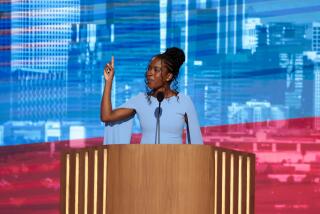As poetry, is it defensible?
- Share via
It’s hard to define exactly the poetry that is Donald H. Rumsfeld. There is a certain beauty in the way the secretary of Defense glissades through a media briefing, sure, with not quite William Wordsworth-like turns of simplicity but, rather, a style that purrs noblesse oblige. There is a rhythm to his utterances that is not exactly Whitmanesque but, instead, peculiarly Rumsfeldian.
Rumsfeld has an unsung and unwitting gift for the language, suggests humorist Hart Seely, who put together the new book “Pieces of Intelligence: The Existential Poetry of Donald H. Rumsfeld” (Free Press). In the slim collection, being released today, Seely has extracted lyrical gems from transcripts of Rumsfeld’s public comments and reprinted them under the headings of Zen verse, haiku, “sonnets” (unrhymed, with no particular meter) and other poetic forms. Each excerpt features complete quotations -- not fragments strung together -- and has a tongue-in--cheek title.
Consider the poem “The Unknown,” culled from a Department of Defense briefing last year. Seely points out that Rumsfeld speaks with Zen enlightenment and indifference: “As we know, / There are known knowns. / ... But there are also unknown unknowns, / The ones we don’t know we don’t know.”
Hear it? The beat is jazzy, perhaps reflecting the rhythms of Rumsfeld’s Chicago childhood, says Seely, 50 (or maybe the alliteration of Spiro T. Agnew’s “nattering nabobs of negativism”).
Seely, a news reporter for the Syracuse Post-Standard, co-edited a similar book, called “O Holy Cow!: The Selected Verse of Phil Rizzuto,” a selection of poetic quotes from the former New York Yankees broadcaster. He also has written humor pieces for the New Yorker and other publications.
Seely, who will say only that he got a six-figure advance for the Rumsfeld book, did not seek the Defense secretary’s blessing. Rumsfeld, 70, apparently has seen the book, “but he hasn’t shared his comments with us,” said Navy Lt. Cmdr. Barbara Burfeind, a Pentagon spokeswoman. Burfeind vaguely recalls seeing an e-mail of excerpts from the book. “I just remember saying, ‘Oh, yeah. That’s Secretary Rumsfeld....’ He’s great. He handles those briefings well, which aren’t exactly easy venues to work in.”
Seely began listening for the poetry in Rumsfeld’s speech in late March, when the U.S.-led war against Iraq began. At home, in Syracuse, with his wife and three kids, Seely tried to find a distraction from the TV news coverage of the war. “I was just sort of fiddling around, goofing around, and then I saw Rumsfeld give one of his news conferences, and he went off on one of those tangents. I remember it just clicked in my head. ‘Wow, that’s the thing.’ I said to a friend, ‘You know who’d be funny to do? Donald Rumsfeld.’ And he said, ‘Yeah. Of course.’ ”
Even before the war, Rumsfeld had been hailed as a media star, famous for his blunt-talking, wisecracking style but never recognized for his ability to toss off an Alexander Pope-ish rhymed couplet. In “Flying, Too,” Seely notes a spontaneous Rumsfeld poem, composed on his feet while meeting with troops in Kyrgyzstan: “Now that is not always true. / Think of the B-fifty-two. / It’s still flying just fine, thank you. / And so am I ... thank you!”
Seely, who has reviewed all the available transcripts of Rumsfeld’s news briefings and interviews, picked up on a rhythm in the secretary’s speech. “He’ll say, for example, ‘The people of America want this. The people of America want this and this and this.’ He rolls a sentence out, then starts over again, then rolls it out longer, then starts over again. They’re like stanzas.”
So the intention is partly to take Rumsfeld down a notch or two?
“Of course it’s meant to make fun of Rumsfeld. I’d be a liar if I said otherwise. This is also meant to make fun of poetry,” says Seely, who has no background in poetry. The way he sees it, the definition of poetry is expansive these days, wrapping in the spontaneous musings of participants in poetry slam competitions and the verse of singer-songwriter Jewel, who wrote a book of poems.
Technically, Seely admits, Rumsfeld’s quotes might not qualify as “real poetry,” but they are a wonder to behold nonetheless. Consider “On Walking Towards a Wall”:
“If you’re walking towards a wall / And you decide you want to go to the opposite wall, / The sooner you make the correction, / The easier it is. / If you wait until you’re right face up against the wall, / Then you’ve got to make a sharp turn.”
Says Seely: “Can you imagine? Here’s arguably one of the 10 most powerful men in the world ... and he’s talking [to the press] about the items of world history we’re going to be buried with, OK? And he’s talking about walking across a room, and if he doesn’t turn, he’ll hit the wall. Somewhere, in the overall scheme of things, those moments have to be preserved.”
More to Read
Sign up for our Book Club newsletter
Get the latest news, events and more from the Los Angeles Times Book Club, and help us get L.A. reading and talking.
You may occasionally receive promotional content from the Los Angeles Times.







